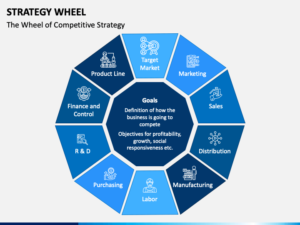
Your firm’s purpose describes the unique value it brings to the world. It’s the core of your strategy. It determines who you are, why you matter. It should be clear and easy for stakeholders to understand because your overall strategy flows through it.
What Purpose is and Is Not
Managers sometimes start off on the wrong foot, failing to think carefully about purpose. Or they don’t take the process far enough to see how all the activities in their businesses support their intended direction. Studying other companies’ success and failures is a good start, but more is required. To develop a successful strategy, experience, evidence-based information, collaboration and exhaustive introspection are also needed.
Using Your Purpose
To visualize and record how a system of value creation backs up a firm’s purpose, we recommend using the time-honored approach known as the “strategy wheel.” The center, “purpose,” points to why you exist – what you do differently or better than others – and the unique configuration of activities and resources around the rim shows what will enable you to deliver on that purpose.
Use Evidence, not Just Intuition
Companies will likely make a number of assumptions in building the strategy wheel. Managers in all professions are challenged because of such assumptions. In developing a strategy, however, these can be mistakes. Be rigorous in challenging what you think you know. To assess whether what you are doing is working, you need to look for the data and the facts and not just rely on intuition. For example:
- What evidence do you have that you are the low-cost provider or the premium producer you say you are?
- Where, exactly, in the process do you add value?
- Can your firm support that view with facts – internal process measures of key performance drivers and outcome measures like sales results, profit margins, market share or return on investment?
The Strategy Wheel is One of Several Frameworks
As executives know, the strategy wheel alone is a single framework that can be used as a method of strategic formulation and selection. As Covid-19 has shown, firms will need to continually adapt plans to accommodate economic, market and internal shifts and retool the approach. In this respect, strategic planning is never quite finished.
We’re planning studies for 2023 – please take our industry hot issues five question survey here.
Source and recommended reading: Montgomery, Cynthia, The Strategist, 2012, Harvard Business School, Harper Collins Publishing.

Recent Comments